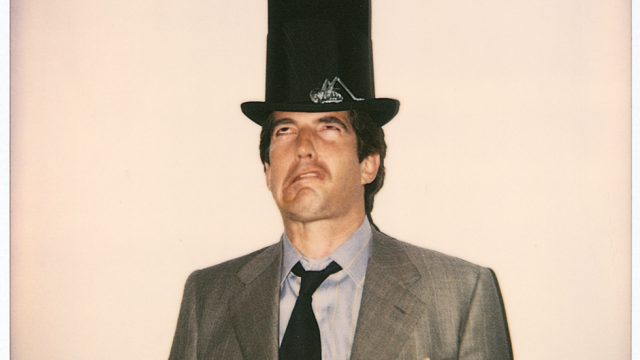Good morning! I have lots of good stuff for you, and I hope you’re enjoying the picture of John Kennedy Jr. as much as I am!
On the 19th, Christopher Campbell listed the many works Badlands has influenced for Film School Rejects:
“Arguably still his best, Badlands is certainly Malick’s most influential movie, which is interesting considering it’s so distant from his other efforts. Much of the filmmaker’s general (mainly later) style is imitated, but Badlands is perhaps the only one that has very directly inspired other films as well as music artists and comics. The first of two of Malick’s films selected for the National Film Registry for its ‘cultural, historical, or aesthetic significance,’ Badlands is highlighted by the Library of Congress for being ‘one of the most impressive of directorial debuts.’ The film is in the Criterion Collection, it has inspired fashion tips and fashion photography and so much voiceover narration, it marked the very brief first screen appearances from the star’s sons Charlie Sheen and Emilio Estevez… Its legacy goes deep.”
Kate Storey looked at the history and legacy of John Kennedy Jr.’s criminally underrated magazine George for Esquire on the 22nd:
“But Kennedy’s instincts were right: In the twenty years since his death, politics and pop culture have become so intertwined that candidates now spend nearly as much time courting voters on late-night shows as they do on the Sunday talk circuit. Politicians are covered as if they were celebrities, while celebrities seek out a voice on politics. The current president is largely a product of reality television, and his predecessor recently signed a production deal with Netflix. Oprah Winfrey has been seriously touted as a potential presidential candidate, as have—somewhat less seriously—The Rock and Mark Cuban. As the son of the thirty-fifth president and an elegant First Lady–turned–book editor, Kennedy was uniquely positioned to both cover and promote the marriage of politics and pop culture—because he lived it.”
On the 23rd, Meagan Navarro marked the 20th anniversary of David Cronenberg’s eXistenZ over at Bloody Disgusting:
“It’s fitting that eXistenZ marks Cronenberg’s first original screenplay since Videodrome, his obsession with humanity’s technology obsession and biology-based fears feel like a direct thematic continuation. Granted, eXistenZ is more firmly rooted in sci-fi thriller, but the horror elements are most certainly prevalent. 1999 was the year of cinematic exploration of virtual reality, between The Matrix, The Thirteenth Floor, and eXistenZ. While the former became a box office juggernaut, the latter remains timeless thanks to its socially relevant themes and enduring practical effects. And any time Cronenberg explores new ways to manipulate, alter, and twist the human body in grotesque ways, it’s worth the watch.”
On the 24th, Emma Dibdin of The Hollywood Reporter discussed Luke Perry’s final episode of Riverdale:
“Though brief, the scene encapsulates the warmth and humanity Perry brought to Fred, as well as his role as the show’s moral compass. He doesn’t start scheming to try and clear Archie’s name, or threaten Ronson’s family on his son’s behalf, or act in any of the impulsive ways that most Riverdale characters would. He simply listens, and reminds Archie of who he is.”
Also on the 24th, Daniel Roberts explained how Disney is banking on millennial nostalgia to make their new streaming service a success on Yahoo!:
“Millennials grew up on Disney movies like The Little Mermaid (1989) and Toy Story (1995), and on animated shows like DuckTales (1987) and Goof Troop (1992), and live-action Disney and ABC shows like Boy Meets World and That’s So Raven. Those will all be on Disney+. Many millennials are new parents or soon to become new parents, making them a possible sweet spot target demographic for Disney.”
Alan Sepinwall spoke to David Milch, and the stars of Deadwood, about the show’s return and his Alzheimer’s diagnosis on Rolling Stone on the 25th:
“Milch’s impulsive nature could at times be curse as much as blessing. It may have played a role in the series’ premature end. Dispute remains as to exactly why HBO pulled the plug — including budget overruns resulting from Milch’s improvisational approach and the fact that HBO had to share ownership of the series with Paramount — but a crucial detail all agree on was that, while Milch was negotiating to potentially keep the series alive for a truncated fourth season, Olyphant was (like several of his co-stars) in the process of buying a house, assuming he’d have another year’s salary to help pay for it. Milch, anxious at hearing this news from Olyphant, suggested the show had been canceled. Olyphant in turn called his representatives, more calls were made, and, as he puts it now, “It was a bit of a grass fire, that it became difficult for the two sides to walk back. In fact, the show was not over at all, but that by the time that spread around, no one wanted to back down from it. So it just became fact.”
Enjoy!

